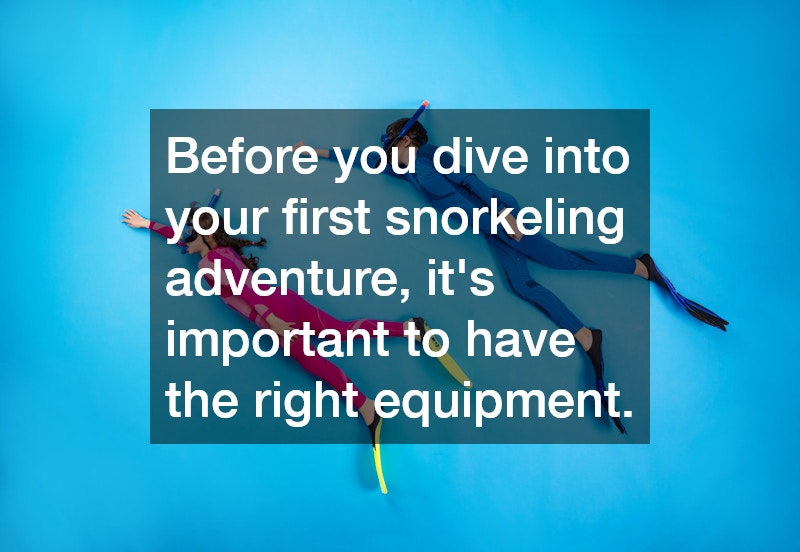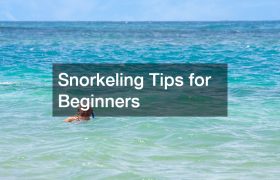
Snorkeling is one of the best ways to explore the underwater world, allowing you to experience vibrant marine life and stunning underwater landscapes without the need for heavy scuba gear or specialized training. Whether you’re planning your first snorkeling adventure on a tropical vacation or just want to explore the local waters, getting started with the right tips can make your experience more enjoyable and stress-free.
In this guide, we’ll cover essential snorkeling tips for beginners, helping you make the most of your time in the water while staying safe and having fun.
1. Choose the Right Gear
Before you dive into your first snorkeling adventure, it’s important to have the right equipment. The basic snorkeling gear includes a mask, snorkel, and fins, all of which are essential for your comfort and safety in the water.
Here’s what you need to know:
Mask: A well-fitting mask is critical. It should provide a good seal around your face without feeling too tight. Make sure to test it out before heading into the water by placing the mask on your face without using the strap, and gently inhaling through your nose. If it stays on your face without falling, you have a good fit.
Snorkel: The snorkel should be easy to breathe through and designed to prevent water from entering the tube. Look for a dry or semi-dry snorkel, which has a valve that keeps water out, making it easier for beginners to use.
Fins: Proper-fitting fins help you move more efficiently through the water without expending too much energy. Choose fins that are snug but not too tight to avoid discomfort. Practice walking in them on the beach before getting into the water to get used to the feel.
Renting or purchasing quality gear designed for snorkeling can greatly enhance your experience and make it easier to focus on exploring the underwater environment.
2. Practice in Calm, Shallow Water
For your first snorkeling experience, start in calm, shallow water to get comfortable with your gear and movements. Shallow waters, such as those found at a beach or lagoon, are ideal for practicing breathing through the snorkel and adjusting to using fins.
Take your time getting used to breathing through the snorkel while floating face down in the water. It might feel unnatural at first, but with a little practice, you’ll soon be breathing smoothly. Focusing on slow, steady breaths will help you stay calm and relaxed. This is also a good opportunity to practice clearing your snorkel by blowing out any water that enters the tube.
By practicing in a controlled environment, you’ll gain confidence and be better prepared to enjoy deeper water or more challenging conditions when you’re ready.
3. Stay Relaxed and Float
One of the biggest challenges for beginners is learning how to stay relaxed in the water. Snorkeling should be a peaceful experience, allowing you to effortlessly float on the surface and observe marine life below.
Remember, you don’t need to kick or move constantly. Use your fins to glide gently through the water and let your body float. If you start to feel tired, simply lie back and float to rest. Staying relaxed will help you conserve energy and make your experience more enjoyable.
An important part of snorkeling is learning to trust your equipment and staying calm. The more you practice, the more comfortable you’ll feel floating and breathing through your snorkel.
4. Stay Aware of Your Surroundings
While snorkeling, it’s easy to get lost in the beauty of the underwater world, but it’s important to stay aware of your surroundings. Pay attention to your location in relation to the shore, boat, or other markers, so you don’t drift too far out or into dangerous areas.
If you’re snorkeling in a group, stay close to your partner or guide for safety. It’s also a good idea to look up occasionally to check your surroundings and make sure you’re staying within safe distances. Be aware of currents, and always avoid areas with strong waves or water conditions that may be too challenging for beginners.
5. Respect Marine Life
One of the best parts of snorkeling is the opportunity to observe marine life up close, but it’s essential to respect the underwater environment. Avoid touching coral, fish, or other creatures, as this can harm delicate ecosystems. Many marine animals are fragile, and even a gentle touch can cause damage.
Keep your distance from wildlife, and resist the temptation to chase or disturb any creatures you encounter. Practicing responsible snorkeling helps preserve these beautiful environments for future generations.
6. Use Sun Protection
Spending time snorkeling in the water can expose you to strong sunlight, especially in tropical destinations. Since you’ll likely be floating face down, much of your back and legs will be exposed to the sun. Protect yourself from sunburn by wearing a rash guard or swim shirt with UV protection.
In addition to wearing protective clothing, be sure to apply reef-safe sunscreen that won’t harm the coral reefs and marine life. Many sunscreens contain harmful chemicals that can damage coral, so choose eco-friendly products whenever possible.
7. Plan for Rest Breaks
Snorkeling can be tiring, especially if you’re new to the activity. Plan for regular rest breaks to avoid exhaustion. If you’re snorkeling from a boat, take advantage of opportunities to get back onboard for a break, rehydrate, and regroup before heading back into the water.
If you’re snorkeling from the shore, swim back to shallower water when you need a rest. Keeping your energy levels up will make the experience much more enjoyable and help prevent fatigue.
.




